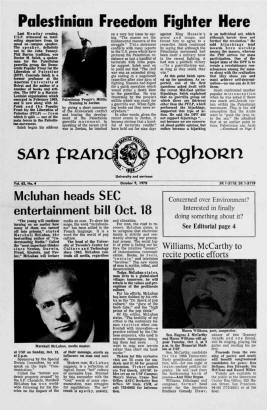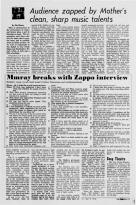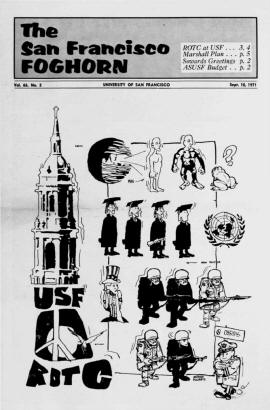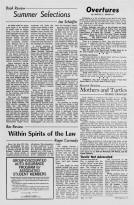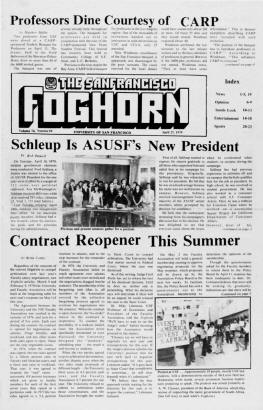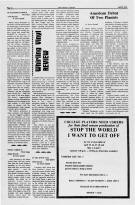San Francisco Foghorn
1970 October 9
Vol. 65 No. 4
Mmray breaks with Zappa interview
By
Zak Mmray, p 5
Audience zapped by Mother's clean, sharp music
talents
By Zak Mmray, p 5
Mmray: Ah, it looks like a good crowd out there.
Zappa: I'll trust your judgment; I don't know what your criterion for a good crowd is, b u t ...
M: Well, they haven't commenced screaming yet, but a few of them are trying to crawl into the P.A. speakers.
Z: Well, that's your typical San Francisco acid-freak-burn-out, isn't it?
M: Oh, yes, yes, they're quite ripped. They should be primed for you.
Z: ... (beginning of a glare) (read more)
Source: usfca.edu
Frank Zappa is considered by many to be a genius. Further evidence is the new Straight Records lp The Mothers Live at Fillmore East. As most ot you probably know, the Mothers of invention now inciuaes two incredible vocalists, Howard Kaylan and Mark Volman, also known as the Fluorescent Leech and Eddie. They not only sing, but they dance and give great dramatic readings of the dialog which is an integral part of the Mother's stage show, and consequently, also of this album.
The bass player is a friend of theirs, named Jim Pons who also sings and talks. Volman, Kaylan and Pons are all ex-members of the Turtles, Los Angeles' famed folk-rock group who had such hits as "Happy Together," "It Ain't Me Babe."
Aynsley Dunbar, formerly of the Aynsley Dunbar Retaliation and the John Mayall Group, is a fantastic drummer. And of course, there are the long time favorites, Ian Underwood on keyboards and sax, and Don Preston on Mini-Moog.
The form of the album is basically a continuous story with a couple of appendices. I don't wish to say anything about the story itself, because I might mar the sheer joy which a healthy person experiences upon first listening. I'll give you a hint though, it has something to do with groupies.
Frank Zappa narrates as well as plays the guitar on the lp. Some purists may argue that this work is not as important as Zappas' previous albums, and I don't agree. It is technically precise, the musicianship is superb, and it is an excellent audio representation of what tne Mothers of Invention do in concert. This is a beautiful album. Keep your eye(s) out for Billy the Mountain, 200 Motels and the Grand Mothers.
Source: usfca.edu
After listening to this album several times, one has a pretty clear idea why Frank Zappa is recording on his own record label these days, and why many radio stations – even the extremely progressive ones – have denied it extensive airplay. It isn't a commentary on the album's quality, which is quite excellent, but rather on its content, which teeters dangerously between the extremes of musical virtuosity and lyrical outrageousness. Sheik Yerbouti, as you might expect from Zappa, is one of the strangest and most engaging albums you'll have the opportunity to hear this year.
If you're looking for that magical guitar work which Zappa has time and time again proven himself capable of, there'll much to please you in this double-album set. Numbers like "Rat Tomago" and "The Sheik Yerbouti Tango" display Zappa's dazzling instrumental abilities with the lead guitar, and in "Rubber Shirt", he carries his talents to the limit by demonstrating a totally convincing bass guitar solo. There seems little doubt after these compositions that Zappa is one of our major jazz-rock instrumentalists.
But the humorous cuts are the ones that'll probably leave you gasping. Peter Frampton is satirized in the hilarious "I Have Been In You", disco is mercilessly grilled in "Dancin' Fool", and in "Broken Hearts Are for Assholes", Zappa points his death ray of parody at every sentimental love song ever written. The best piece of parody on the entire album, however, is a completely offensive version of "Jewish Princess" which also manages to be blackly funny, as well.
This album is not for everybody. It's sexual double-entendres might offend some, and fans of straight-ahead rock and roll may find his reliance on jazz oriented musical figures a bit difficult to become accustomed to – but for everybody else, this musical novelty could be a good investment. I guarantee it'll be vastly different from anything else in your collection.
Source: usfca.edu
